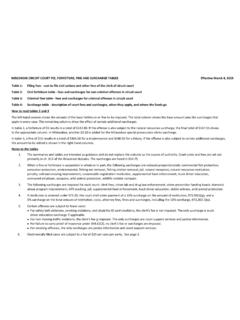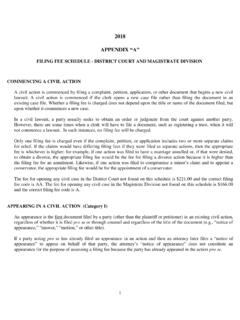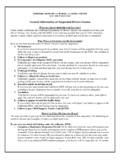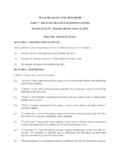Transcription of TEXAS TRUANCY LAWS
1 TEXAS TRUANCY LAWSThe laws regarding TRUANCY can be found in Chapter 25of the Education Code, and these laws emphasize theimportance of your child attending school all day. Anyabsences must be excused by their school, and excessiveunexcused absences could result in charges beingbrought against: you as a parent for Parent Contributing to Non-attendance, if your child is required by law to attendschool; and your child for Failure to Attend School, if he or sheis 12 years old or older, but not yet your child has unexcused absences for 10 or moredaysor parts of days in a 6-month periodthe schooldistrict MUST file the above charges on the addition, the school district MAY file on your child ifyour child has unexcused absences for 3 or more daysor parts of days in a 4 week should receive a warning letter at the beginning ofthe school year stating you are subject to prosecution if your child fails to attend school for the periods stated you receive the warning letter and your child fails toattend school as outlined above, charges can be , even if you do not receive this warning it is nota defense to prosecution, and you should call the schoolattendance clerk to ask about your child s charges are brought.
2 The school district is also re-quired to file a statement with the court that it tried inter-vention measures to prevent the filing, but that those at-tempts failed. The statement should also indicate whetheror not your child receives special education IS REQUIRED TO ATTEND SCHOOL?The law doesn t require you to enroll your child in pre-kindergarten or kindergarten. If you do enroll your child,you and your child must follow state attendance laws. Generally, children who are 6 years old by September 1,must be enrolled in school and must attend until theyturn 18. A child is exempt from attendance if the child: Attends a private or parochial school; Has a temporary, fixable physical or mental condi-tion that makes attendance impracticable and has adoctor s note specifying the condition, indicating thetreatment, and stating the probable time period yourchild will be absent for the purpose of treatment; Is at least 17 years old and Is attending a course to prepare for the highschool equivalency exam, and: Has parent permission to attend; Is required by court order to attend; Has established residence apart from theparent or guardian; or Is homeless; or Has received a diploma or equivalency certifi-cate; and Meets any other exemption listed in TEXAS Educa-tion Code HAPPENS AT court ?
3 Parents or guardians will be summoned to appearbefore a justice of the peace or municipal-courtjudge. You must bring the named child if the sum-mons directs you to do so. If a parent receives asummons and doesn t appear with the named child,the parent and the child could each be charged withanother Class C misdemeanor for Failure to Appear. Juveniles must enter pleas of guilty, not guilty, or nocontest (nolo contendre) in open court . Hearingsmay be open to the public or closed at the discretionof the judge. If the student was absent, the student s parent orguardian should bring all documents that show whythe student was absent. Neither parents nor students receive appointedlawyers in juvenile TRUANCY cases. You can representyourself, or you can hire a lawyer on your to Attend School cases and Parent Contributingto Nonattendance cases are Class C misdemeanors thatcarry maximum fines up to $500 on each case pluscourt judge can enter one of two types of probation withcourt A final conviction: A judge is limited by law to whatcan be ordered.
4 This will result in a final convictionagainst you, your child, or both that could show upon a criminal history check. A fine will be A deferred disposition: A deferred disposition delaysthe end of the case until a period of time has judge can set conditions that a charged personhas to follow during that period. If the chargedperson reaches the end of the period withoutbreaking any of those conditions, the case is dis-missed. This results in no reportable conviction. Aspecial expense fee will be court has the discretion to order that your childwork toward a GED if your child is over 16 years ofage and meets other judge could also require your student to performcommunity service or attend counseling TO OBTAIN AN EXPUNCTIONAn expunction is a legal procedure that essentially erasesthe legal effects of a criminal conviction. A personwhose conviction has been expunged is released fromthe legal disabilities resulting from a conviction, andthe government cannot make the conviction known forany student may obtain an expunction of a TRUANCY convic-tion if the student has been convicted of only 1 priorattendance apply for an expunction, the applicant must pay a$30 fee and submit a written request that:1.
5 Is made under oath;2. States that the applicant has not been convicted ofmore than one violation of Section of theEducation Code; and3. Is in any form determined by the court must expunge a conviction if: Before the student s 21st birthday, the studentpresents the court with proof that he or she hasobtained a high school diploma or equivalencycertificate (GED); or The court finds that the student followed the stepsto obtain an expunction and complied with thecourt ordered conditions at the time of the TO OBTAIN A DISMISSALA dismissal means that the charges are dropped, and thereis no conviction. The complaint must be dismissed if:1. The school district files the charges too charges must be filed no later than 10 daysafter the last day that the school claims the stu-dent missed;2. The student is exempt from attending school;3. The court lacks jurisdiction (typically when theschool files charges on a child who is exempt fromattendance); or4.
6 The person complies with all of the require-ments of a deferred ASKED if I can t afford to pay the fines and court costs?You must make a good faith effort to pay the fineand court costs, and you should tell the court beforeany money is due. You can request an indigencyhearing. At that hearing, you will have to tell thecourt about your income and other financial obliga-tions. If you qualify, some or all of your fines andcourt costs could be replaced by an order to performcommunity service or by credit for the time spentin jail. Also, the judge has the discretion to waive all fines and court costs if the judge finds that they impose a financial if my child and I do not complete the court orders?You can ask the court for an extension. If yourchild violates the court s order, the court couldorder that your child be taken into custody basedupon an affidavit (a written, sworn statement)showing that your child violated the court s an affidavit like that is filed, the court will hold ahearing to determine whether your child violatedthe court s order.
7 If the court determines that yourchild did violate an order, it can hold your child incontempt and impose a fine. Additionally, the courtcan revoke or deny your child s driver license. If theorder was a deferred-disposition order, the court canfind your child guilty of TRUANCY . Parents can also beheld in contempt for violating parental court penalty for contempt is a fine of up to $100, 3 days in jail, or both. Also, some school districtsmay report your convictions to social services whichcould result in a denial of services to your happens if we complete our orders?If you received a final conviction and completedyour orders, your cases will be closed. You maythen qualify for an expunction. If you received adeferred disposition, your cases will be dismissed. IN ADDITION TO THESE STATE LAWS, IT IS IMPORTANTTO KNOW THE POLICIES OF YOUR SCHOOL DISTRICTOR CHARTER 10/12 TRUANCYGUIDE Copyright 2012 TEXAS YOUNG LAWYERS ASSOCIATION Created by the TEXAS Young Lawyers Association.
8 All rights re-served. No part of these materials may be reproduced in any formor for any other purpose without the written consent of the TexasYoung Lawyers Additional Copies Please Contact:Public Information DepartmentState Bar of Box 12487 Austin, TEXAS 78711-2487(800) 204-2222, Ext. E X A S Y O U N G L A W Y E R S A S S O C I A T I O NA N D T H E S T A T E B A R O F T E X A S






